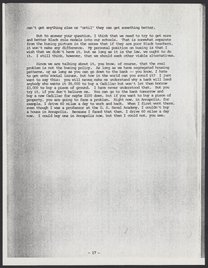Maximizing Black Potential in Science & Technology: Toward the Year 2,000
Maximizing Black Potential in Science & Technology: Toward the Year 2000
- 1975-Nov

Rights
Download all 11 images
PDFZIPof full-sized JPGsDownload selected image
Small JPG1200 x 1545px — 544 KBLarge JPG2880 x 3708px — 3.4 MBFull-sized JPG5380 x 6927px — 10.8 MBOriginal fileTIFF — 5380 x 6927px — 107 MBTyped transcript of Samuel P. Massie's (1919-2005) remarks, and of a question-and-answer exchange between Massie and Dr. Robert Bradford (1931-2011), from the 1975 Science Symposium of the National Consortium for Black Professional Development. The symposium, which was held November 10-13, 1975 at Kentucky Dam Village State Resort Park, Gilbertsville, Kentucky, was titled "Maximizing Black Potential in Science and Technoloy: Toward the Year 2000."
| Property | Value |
|---|---|
| Author | |
| Contributor | |
| Place of creation | |
| Format | |
| Genre | |
| Extent |
|
| Language | |
| Subject | |
| Rights | In Copyright |
| Rights holder |
|
| Credit line |
|
Institutional location
| Department | |
|---|---|
| Collection | |
| Series arrangement |
|
| Physical container |
|
View collection guide View in library catalog
Related Items
Cite as
Massie, Samuel. “Maximizing Black Potential in Science & Technology: Toward the Year 2,000,” November 1975. William A. Lester, Jr. Papers, Box 26, Folder 5. Science History Institute. Philadelphia. https://digital.sciencehistory.org/works/6tnx5zk.
This citation is automatically generated and may contain errors.
Rights
Download all 11 images
Searchable PDFmay contain errorsZIPof full-sized JPGsDownload selected image
-
Keyboard Shortcuts
Previous image shift + or , Next image shift + or . Pan image Zoom in + or shift + Zoom out - or shift + Zoom to fit 0 Close viewer esc Also
Mouse click to zoom in; shift-click to zoom out. Drag to pan. Pinch to zoom on touch.















